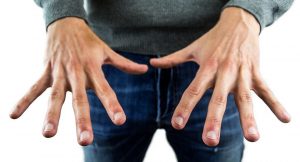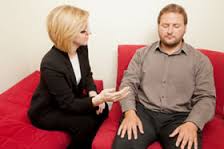Hypnotherapy to stop nail-biting and other bad habits
 As with most things, bad habits such as nail-biting, come in all shapes, sizes, and levels of severity and hypnosis offer a powerful and effective solution.
As with most things, bad habits such as nail-biting, come in all shapes, sizes, and levels of severity and hypnosis offer a powerful and effective solution.
Nail biting, hair pulling, teeth grinding, skin picking, being eating/drinking, smoking, gambling, gaming and constantly checking social media are all common habits that you may find yourself partaking in without even realising. What all of these things have in common is that you find yourself doing them or wanting to do them subconsciously-meaning that you do not go through the thought process of telling yourself to do it, you do.
For nail-biting, you may suddenly realise that you are biting them without having told yourself to put your hand in your mouth. You might be twisting your hair right now yet was oblivious to it a moment ago. Another typical moment comes in the evening when your mind suddenly pings telling you that you want a packet of crisps despite the fact you aren’t remotely hungry.
Bad habits are things that you find yourself thinking or doing when, in fact, you want to do the opposite.
Nail Biting
Onychophagia is the medical term for nail-biting, the act of biting the soft tissue, the cuticle and the nail itself. Typically, 45% of children bite their nails compared to an average of 5% of adults. Studies have shown that it is more common in men, especially during teenage-early adulthood.
It might be purely a bad habit, but the chances are that if you bite your nails, you are prone to stress, worry, and anxiety. It is possible that you only bite your nails in your sleep; in fact, this is a widespread habit.
Along with being embarrassing and unsightly, nail-biting can be extremely painful. Infections can easily set in as most germs are connected with the hands, and if you have broken skin on your fingers, the chances are you are highly likely to become infected. Nail-biting can also lead to finger and nail deformity, nail loss, bacterial infections both on the hands and in the mouth.
 Nail-biting and Obsessive-compulsive disorder (OCD)
Nail-biting and Obsessive-compulsive disorder (OCD)
While nail-biting is simply a bad habit, crossing over to constant bleeding, infections, pain, loss of the nail and scarring may cross the line into OCD. If the habit causes noticeable interference with daily activities, you may have developed more than a habit.
The treatment for purely the habit is reversal training (hypnotherapy). For connections with OCD exposure and response prevention can be used to treat the condition.
How do bad habits start, and when do they strike?
Generally, bad habits arise when we are feeling anxious, stressed, restless, tired, hungry, bored, or when you are trying to concentrate on something important.
We use these habits as a distraction, to take a moment out, and to make ourselves feel better for a moment.
Although it is often hard to pinpoint the time when it started, the chances are that you got something out of it-it made you feel comforted or better, calmer.
A good example is comfort eating. You’ve had a particularly bad day, and you want something to lift your spirits, so you reach for chocolate, sweets, and crisps. Granted you enjoy them, and you do feel better for a short while. The same principle can be applied to nail-biting and hair-pulling; it succeeded in distracting you from the negative event. Teeth grinding makes you feel stronger, more inferior and in control. Soon enough, those comforts create a whole host of other stressors; you gain weight, your nails/fingers look raw, your teeth become damaged, and your hair snaps and falls out. As the habit becomes just that you stop noticing the damage you are doing to your body as you see it every day. You may even get annoyed when friends and family Comment on your condition.
The good news is that you can break the cycle of these habits, and this is where hypnosis is so effective.
So, how does hypnosis break the habit?
 Hypnosis can be described as a focused concentration with deep relaxation. Hypnotherapy allows you to become mindful of what you are doing rather than steps to remind yourself not to perform this habit. It means that you will notice your hand coming towards your mouth, the plate of biscuits, your hair or clenching your jaw rather than just automatically doing it. The same can be applied to smoking too. These habits are subconscious, so you aren’t aware that you are choosing to do it in the first place, which is no wonder why it is hard to control!
Hypnosis can be described as a focused concentration with deep relaxation. Hypnotherapy allows you to become mindful of what you are doing rather than steps to remind yourself not to perform this habit. It means that you will notice your hand coming towards your mouth, the plate of biscuits, your hair or clenching your jaw rather than just automatically doing it. The same can be applied to smoking too. These habits are subconscious, so you aren’t aware that you are choosing to do it in the first place, which is no wonder why it is hard to control!
Hypnosis makes you aware of your actions.
One technique used is the suggestion of when you want to bite your nails, you must turn your hand upside down to do it. The idea behind this is that you are being made aware of what you are doing-This also involves self-hypnosis.
It is far easier to stop doing something when you are fully aware of what you are doing than trying to put blockades in place. When you find yourself habitually thinking; “I need some crisps this instant”-hypnosis enables you to override the thought process with more effective thinking. – “yes, I do want some crisps, but I also really want to maintain/lose weight.”
Hypnosis reduces anxiety and stress allowing you to break the habit.
Under hypnosis, you are given specific suggestions to help you break the habit. In your deep state of relaxation, you are far less likely to feel the depth of stress and anxiety, which has caused you to develop these negative habits.
Hypnosis allows you to feel calm and relaxed, which enables you to manage stress levels and to feel more in control of your actions as you become aware of them. The goal is to replace negative thoughts and habits with positive suggestions.
How long does it take to break the habit?
 Change can be noticed very quickly, sometimes after a single session, but not everyone will be able to do this and will require further sessions. The number of sessions depends on the depth, time and length of the habit. The strength of desire to quit also plays a large part.
Change can be noticed very quickly, sometimes after a single session, but not everyone will be able to do this and will require further sessions. The number of sessions depends on the depth, time and length of the habit. The strength of desire to quit also plays a large part.
Since we are all different and will progress at different speeds, you should be wary of those hypnotherapists that promise to cure you in one session. Remember that hypnosis is not one size fits all; what works well for one may not affect the next person. It is also vital that you look for an accredited professional hypnotherapist. A reputable hypnotherapist (link to Chris about page) will be happy to meet with you without charge, to get to know you and discuss your options. They will be upfront about how long the process may take and how much it will cost. If you choose Fleet Hypnosis, you will not only benefit from treatment but will also learn relaxation techniques to use at home. You might get instant results, but equally, it may take some time.
Hypnotherapy gives you relaxation and peace of mind that allows you to become more patient with yourself.
Self-hypnosis
 Ultimately, all hypnosis is self-the thoughts which you repeat to yourself. The most important part of learning self-hypnosis is learning to relax. Most bad habits develop when we feel stressed or out of control with our situation-bad patterns are the immediate reward of distraction. Sadly, these rewards have a downside, especially when it comes to self-care. Habits become a nuisance because they quickly become ineffective in shadowing the real issue. The deep state of relaxation lets your body and mind relax while remaining fully in control, removing the need to resort to harmful rituals.
Ultimately, all hypnosis is self-the thoughts which you repeat to yourself. The most important part of learning self-hypnosis is learning to relax. Most bad habits develop when we feel stressed or out of control with our situation-bad patterns are the immediate reward of distraction. Sadly, these rewards have a downside, especially when it comes to self-care. Habits become a nuisance because they quickly become ineffective in shadowing the real issue. The deep state of relaxation lets your body and mind relax while remaining fully in control, removing the need to resort to harmful rituals.
The Devon School of Hypnotherapy offers a day course in Self Hypnosis. Click here to discover more about this highly sort after Paignton course.
What other bad habits can hypnotherapy stop?
Any habit can be stopped using hypnotherapy and hypnosis.
Most commonly treated are; nail-biting, smoking, overeating, hair pulling, teeth grinding, binge drinking, gambling, addiction, and fidgeting.
So, if you have gotten to the stage where you want to break the cycle, hypnotherapy will help you stop for good. Hypnotherapy can help you break the stress and anxiety, which is often the cause of negative habits forming. Not only will you finish treatment habit free, but you will feel calmer and more relaxed.
If you would like further information or book a free, no-obligation consultation, please telephone 01803 500300 or email chris@fleethypnosis.com.
